I’m being bullied because I’m LGBTQ+

This week is anti-bullying week, a week that recognises the importance of standing up against bullying, the value of friendships and support if you are ever faced with bullying. We spoke to the experts at The Proud Trust about how to get support when you are being bullied for your sexual or gender identity.
What does bullying look like?
Bullying can exist in many different forms. It could be physical bullying, where someone uses their body or an object to hurt you; or verbal bullying, when someone calls you names or says things to/about you that are particularly nasty.
Bullying can also happen online, this type of bullying is known as cyberbullying. Cyberbullying may occur through direct messages but also could be done through comments or mentions on a profile too. Some people may also choose to use anonymous profiles, these can be reported and most social media channels will have steps to prevent cyberbullying.
Bullying can be a one-off incident or it can go on for a long time and can happen to anyone.
Am I being bullied for my LGBTQ+ identity?
There are also some specific types of bullying relating to someone’s sexual or gender identity, such as Homophobia, Biphobia and Transphobia. This can occur in many forms and may include name calling, refusal to use someone’s chosen name or making comments relating to harmful stereotypes.
Homophobia, Biphobia and Transphobia are specific types of bullying which stem from a particular dislike or prejudice towards members of the LGBTQIA+ community. This type of bullying can include things like:
- ‘Joking’ that something which is perceived to be negative in some way is ‘gay’ (e.g. ‘that’s so gay’)
- Not treating Trans and Non-Binary people as valid.
- Implying that bisexuality is a ‘phase’ between being gay or straight.
LGBT bullying statistics show that this type of behaviour has led to 42% of LGBTQ+ school pupils being bullied in the past year, double the number of non-LGBT+ pupils (Stonewall).
Friendships & safe spaces for the LGBTQ+ Community
One of the most effective ways to combat bullying is to create safe spaces where someone can be themselves. This could be somewhere in your school or at your local youth groups. Having a space where you can be proud and be your authentic self around people who may have similar experiences can be a great form of support.
If you’re looking for a local LGBTQ+ youth group, you can use our Youth Group finder here.
For LGBTQ+ people, having a community who have similar lived experiences to you can be a really powerful form of support. Having a space filled with other LGBTQ+ people can be a good place to talk about how you’re feeling and help you talk to an adult who can help too. Speaking to people who may have been through something similar can not only help you feel less alone but can also be a good place to get advice on your next steps.
Whilst it may feel daunting to speak to someone, true friends embrace you for who you are, regardless of your sexual orientation or gender identity. They provide a safe space where you can be your authentic self without fear of judgement.
How can I help combat this type of bullying?
If you think you or someone you know is being bullied for their sexual or gender identity, there are some steps you can take to combat it.
- Speak Up: If you are a young person and you witness or experience bullying or LGBTQ+ phobia, talk to a trusted adult about it. This could be a parent, teacher or youth worker, you can then make a plan together to solve the issue. If the bullying is happening online, you can report abusive posts on most social media platforms.
- Promote Inclusivity: Encourage and model inclusivity within your friendship group or classroom. Introduce yourself using your pronouns and be sure to use the pronouns people introduce themselves with.
- Supportive Allyship: If you’re not a part of the LGBT+ community, be an ally. Show your support and stand up for your friends and peers who may be facing discrimination of any kind. Watch the video below to find out more about LGBTQ+ allyship from Kyle De’Volle!
You can also find out if your school or workplace has an anti-bullying policy. These types of policies will often have consequences for those exhibiting bullying behaviour. By speaking to an adult you trust, you can look into these policies together and what the process for reporting bullying is.
Where else can I get support?
If you are looking for further support or want someone to chat to, you can come and chat with one of our LGBTQ+ youth workers on Proud Connections Live Chat. Proud Connections Live Chat provides online support for LGBTQ+ young people and the adults in their lives. Proud Connections Live Chat is available across the UK.
You can also chat with the team at The Mix who are there to offer free, non-judgemental and confidential support on bullying and any other issues. You can speak to our online community to get support and information about how to cope with bullying, join our online group chat or sign up for up to eight sessions of free counselling. You can find all the information on how to get in touch here.
Next Steps
- Chat about this subject on our Discussion Boards.
By
Updated on 15-Nov-2023
Sorry, comments closed
No featured article














